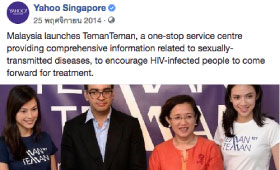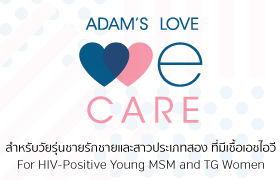|
|
What does every human being want? 4 mins TVC to change a face of HIV in Thai society
Source: amfAR
The videos What Does Every Human Being Want and What a Mother Truly Wants depict true-to-life experiences of a child growing up with HIV and a woman living with HIV seeking to start her own family, respectively. Both aim to educate the Thai public about living with HIV in 2015, when the wide-scale availability of antiretroviral treatment (ART) means the country’s HIV-positive individuals can live long, healthy lives and safely have uninfected children. However, the passage of time has not led to reductions in the stigma that still clings to the disease and continues to motivate discrimination against the 520,000 Thais estimated to be living with HIV. As What Does Every Human Being Want states, “It may not be the HIV virus itself, but the actions of the people around [those living with HIV] that make them weak.” “Unfortunately, people living with HIV are experiencing stigma and discrimination in their schools and workplaces every day,” says Phiangjai Boonsuk, TREAT Asia education project manager. “We want to inspire people who publicly or privately fear and reject those living with HIV to change their perspective and recognize that people with HIV deserve the same things in life as others—acceptance and reasons to hope for the future.” What Does Every Human Being Want chronicles a girl born with HIV from infancy through early adulthood, showing two alternate realities, one in which she is bullied and ostracized because of her HIV status, and one in which she is supported and accepted by her peers and then develops into a successful, happy adult. What a Mother Truly Wants features a pregnant woman living with HIV as she worries that her unborn child will be born HIV-positive and subjected to the same HIV stigma she faced growing up. The woman then gives birth and discovers that her baby is healthy and HIV-negative. “In the past, HIV video campaigns in Thailand have focused on the fact that HIV exists and that it should be treated properly, without focusing on normalizing it,” says Tarandeep Anand, director of both Adam's Love and Purple Haze, the creative team that produced the videos in collaboration with TREAT Asia and the Thai Red Cross AIDS Research Centre. “This is the first time we’ve focused on the medical fact that life continues normally for people with HIV on treatment, and that there is absolutely nothing that they can’t do, whether it is sports, education, work, or having a partner or HIV-uninfected children.” Shot over six days in April, the production involved a cast and crew of over 200, many of whom were themselves educated by the information contained in the videos, and peppered Anand with questions, especially regarding HIV-positive women’s ability to safely have uninfected children. “This is completely new information for most Thai people,” he says. “Many we spoke with doubted that it was possible, and I reaffirmed that with medical advancements it is.” Since their release at the beginning of November, the videos have been featured on Thailand’s leading TV networks, entertainment blogs, and social medial networks. They’ve also been broadcast on LED billboards at over 60 of Bangkok’s highest-traffic intersections and in buses on some of the city’s most popular bus routes. In addition, the International Federation of Red Cross posted the videos, which are available in 20-second, 30-second, one-minute, and full-length versions, on their global and regional YouTube channels. The team hopes to continue to expand the videos’ reach, and is currently working with partners to broadcast them widely on World AIDS Day, December 1. What does every human being want?
What a mother truly wants
|

















